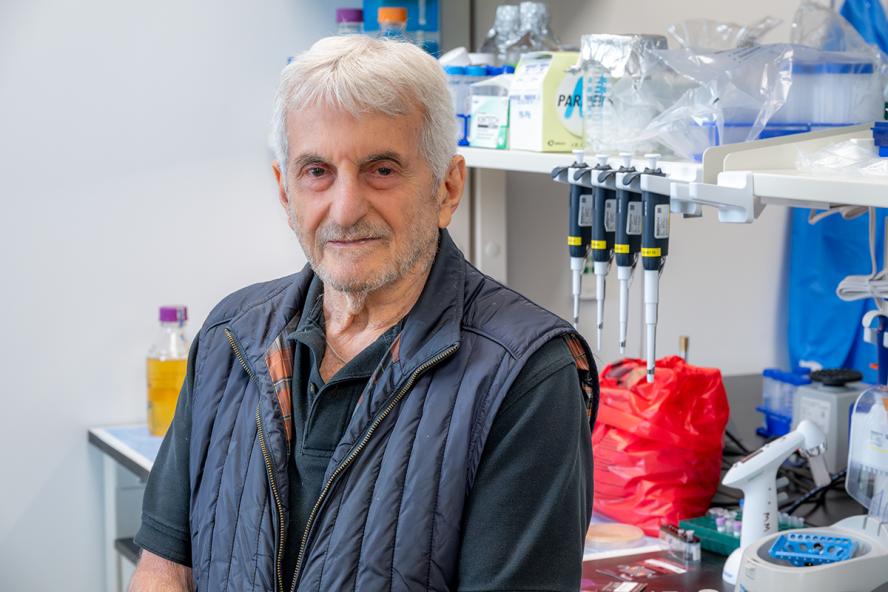-
About
- Leadership & Faculty
- News & Events
-
Admissions
-
Academics
- Graduate
- Advanced Clinical Training
- Continuing Education
- Academic Departments
- Academic Offices
- Simulation Experiences
-
Student Life
- Offices
-
Research
-
- Transformative Research
- Centers & Shared Resources
-
-
Hospitals & Clinics
- Emergency Care
- Hospital Services
-
Community Outreach
- Volunteer
Distinguished Professor and Agnes Varis University Chair Emeritus Saul Tzipori
Dr. Tzipori leaves a lasting impact at Cummings School and the field of global health and infectious disease

Over his tenure spanning more than three decades, Distinguished Professor and Agnes Varis University Chair Emeritus Saul Tzipori was instrumental in expanding the scope of Cummings School of Veterinary Medicine at Tufts University into the study of infectious disease, with prodigious contributions to translational research into prevention and developing vaccines and therapeutics, all the while mentoring and training the next generation of veterinary scientists.
Dr. Tzipori’s inspiration to become a veterinarian came from his childhood. “I was raised in a kibbutz (a communal farm) in Israel, where from age 14 I worked in the dairy, milking cows, taking care of calves, among other related tasks.”
He milked 100 cows twice a day and followed the kibbutz’s veterinarian on his daily rounds of inspection and treatment. He went on to earn his D.V.M. and later Ph.D. in virology at the University of Queensland in Australia. As a doctoral student, Tzipori developed his first vaccine to protect cows against Bovine Ephemeral Fever.
After completing his studies, Tzipori moved south to Melbourne for the next 15 years. As a senior veterinary research scientist at Attwood Veterinary Institute, he researched enteric pathogens and diarrheal diseases, contributing to the identification and study of Enterotoxigenic Escherichia coli (E. coli), Rotavirus, Coronavirus, and Cryptosporidium. The University of Melbourne awarded Tzipori a Doctorate of Veterinary Science for his work. He later joined the Royal Children’s Hospital in Melbourne as the head of the Microbiology Department, translating his knowledge of diarrheal diseases in animals to prevent and treat related diseases in children. He relocated for two years to Bangladesh to be associate director and division head at the International Center for Diarrheal Disease Research, responsible for the diagnostic labs, vaccination trials, and training scientists. During that time, he was honored as a Fellow of the Royal College of Veterinary Surgeons in London for Meritorious Contributions to Learning.
In 1991, Tzipori found his home at Cummings School (then called Tufts University School of Veterinary Medicine).
“I was invited by scientists from the New England Medical Center (now Tufts Medical Center) to establish an infectious disease program,” recalls Tzipori. “As a veterinarian, I had asked to be located at the veterinary school in Grafton. The program was the precursor of the Division of Infectious Disease (DID). The DID became the foundation of the Department of Infectious Disease and Global Health (IDGH), of which I was the foundation chair.”
Tzipori secured funding from the National Institutes of Health (NIH) and the U.S. Department of Agriculture (USDA) to establish the DID at the veterinary school, which facilitated the relocation of the D.V.M. years one and two from Boston to the Grafton campus. The courses included the D.V.M. didactic and lab instructions in microbiology and virology, parasitology, immunology, and molecular biology and genetics. In 1999, the DID launched the Ph.D. program in Comparative Biomedical Sciences.
Tzipori was awarded the Agnes Varis University Chair in Science and Society Professorship for his contributions to scientific discovery. The DID program and team of faculty and scientists continued to grow academically and in research endeavors, conducted in the Cummings School Veterinary Diagnostic Lab (CVDL). Cummings School’s IDGH department was created in 2015 under the direction of Tzipori. The first cohort of students began the IDGH master’s program two years later.
A leader in the field of global health and widely published, Tzipori’s research into infectious disease has centered on food and waterborne enteric pathogens that cause acute or chronic diarrhea in animals and humans. He was the Tufts principal investigator on USAID’s global One Health project and contributed to the organization’s STOP Spillover initiatives to prevent zoonotic viral spread. The Gates Foundation awarded Tzipori several grants, including funding to develop needle-free and temperature-resistant vaccines against tetanus toxin and rotavirus under the Grand Challenges in Global Health Program in collaboration with his colleagues from Tufts Medical School.
Tzipori spearheaded multi-institutional investigations to develop countermeasures against biothreat agents, funded by NIH, which in turn led to Cummings School being selected to host the New England Regional Biocontainment Laboratory (NE-RBL), one of only 12 in the country.
Of his long and accomplished career, Tzipori cites three areas that have been most fulfilling for him since joining Cummings School: “Mentoring a bunch of outstanding individuals who currently hold leadership positions in academic research, government, and industry, being instrumental in the construction of the NE-RBL, the most consequential (and expensive!) building on campus, and my 316 publications listed on PubMed reflecting my contribution to scientific knowledge, I view as my legacy.”